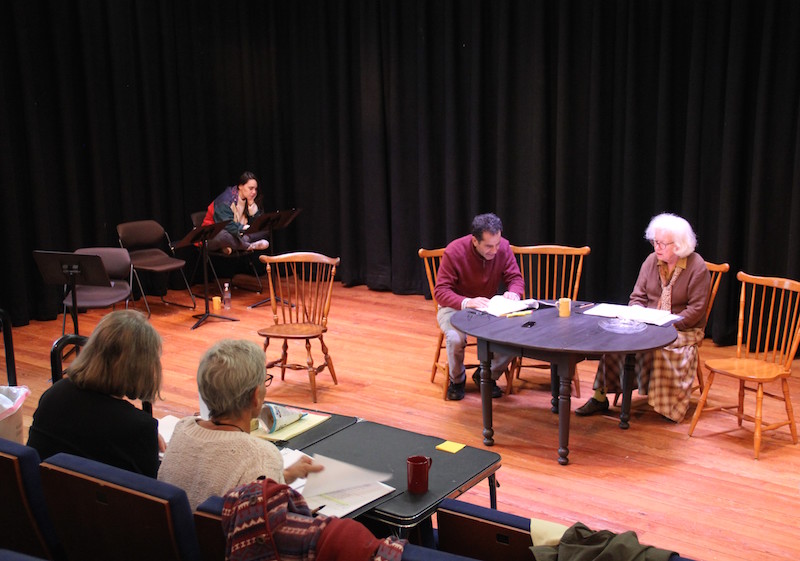After a sold-out first reading of her play Dystopian Daze last September at the Martha’s Vineyard Playhouse, actress and playwright Brooke Adams went back to work on the black comedy she wrote in response to America’s turn toward authoritarianism.
Set in 2025 Los Angeles under a totalitarian regime of police round-ups, mass incarceration and citizen spying, Ms. Adams’s play—now titled Delusion by Proxy—returned to the playhouse Friday and Saturday before a pair of packed houses.
Multiple Tony Award winner Judith Ivey directed the staged reading, set around a table representing the cramped garage apartment where the play takes place. Sound designer JB Lamont’s radio broadcasts, sirens and offstage voices dialed up the ambient tension, which became less ambient and more frightening as the play reached its shocking conclusion.
Delusion by Proxy’s ensemble cast included two players from the 2017 reading: Jamie Donnelly, as beleaguered mom Molly, and Ms. Adams’s sister Lynn Adams, as inquisitive, affluent Diantha, whose character and backstory have grown in a way that adds to our understanding of the play as a whole.
Ms. Ivey cast Ms. Adams’s husband Tony Shalhoub as Allen, who is less Molly’s husband than the forgiving father of their hot-mess daughter Claire (Ella Dershowitz). Adopted at age five and none too sure of her own personality, Claire is involved in an abusive romance with pyschotic Erica (Erica Bitton) and her parents can’t agree on how to handle the situation.
While many families can relate to these conflicts, the unhappiness here is heightened to an almost unbearable pitch by the oppressive government, which reaches for control over every aspect of its citizens’ lives.
“We are living in a frightening world,” Molly says. “People are being killed and imprisoned by this administration all the time.”
Molly and Allen have already kicked the couple out once, after Erica threatened Allen with his own hunting rifle (apparently guns are still okay in 2025, suggesting a nod by Adams to the National Rifle Association’s perceived hold over the right wing).
But living on the street means the young women risk being hauled off to the Center for Research, described cheerfully in a radio announcement as “able to feed and house up to 20,000 eligible residents for free!”
Another announcement offers a reward to citizens who report anyone they suspect of mental instability: “They are a danger to the public.”
Claire and Erica aren’t the only ones faced with government lodging at the cost of their freedom. Molly and Allen are potheads, and marijuana possession carries a heavy mandatory sentence. Allen now abstains because he can’t stop smoking once he starts, but Molly still loves her bong—and Claire isn’t above being bribed with an offer to share.
As Molly schemes to separate the lovers, Allen remains compassionate toward both Claire and Erica.
“I didn’t really mind. I got used to it,” he says, when Molly reminds him of Erica’s abuse when the couples were living together.
But his genially burnt-out demeanor slips when Molly’s sister Diantha blames him for the family’s fall, from a movie industry power couple to a pair of frightened poor people living over a garage.
“You made certain decisions,” says Diantha, whose position is secure because her husband makes films for the regime. “Democracy can’t work now.”
Allen, who spends much of the play snoozing or slumped, stands up straight when tells her he won’t write racist, militaristic propaganda. “I refuse to make a living glamorizing tyrants,” he says. “I care about right and wrong.”
Delusion by proxy, also known as folie à deux or shared psychotic disorder, is a rare clinical condition in which one person’s delusions become shared by another. In Ms. Adams’s play, it may seem that Claire and Erica are the only ones affected by this disorder. But what about Diantha and her husband, and the regime that has citizens turning one another in for crushing punishments to lifestyle choices? Ms. Adams’s play raises some disturbing questions about our own acquiescence to bad acts by people in power.
But it is still a comedy, albeit a deeply dark one with a barely veiled anti-Trump slant. JB Lamont’s sound design yields bitter humor, with announcements like “Al Gore died today in prison” and references to the “Putin Regency Hotel” being built along “newly created waterfront property in Tallahassee, Florida,” and a “Putin Seaside Resort in Austin.” Allen makes an offhand reference to “when there was still insurance.”
Fans of political satire should keep an eye out for Delusion by Proxy in future playhouse seasons, as artistic director MJ Bruder Munafo has a track record of developing new plays from readings to full productions.
This weekend the playhouse will host another limited release with Stag’s Leap, a theatrical rendering of poetry by Sharon Olds. It plays Oct. 26 and Oct. 27 at 7 p.m. For more information, visit mvplayhouse.org.







Comments (2)
Comments
Comment policy »